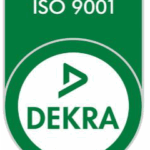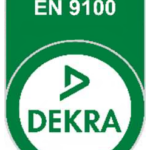
A mature quality system
The ISO 9001 – v2008 allowed, at first, to structure a system requirement by formalizing and consolidating our working practices which contributed to establish a minimum level of execution.
The ISO 9001 – v2015 version has structured a managerial requirement, modernized our practices by making us more responsive to all interested parties. The frequency of analyses and progress points has been clearly accelerated, leading to a permanent adjustment of decisions, planned actions and the existing system with measures, a follow-up of the resources and finally the evaluation of the customer satisfaction.
In 2024, MECA MAGNETIC was awarded EN 9100, an international quality and process management standard recognised in the aerospace and defence industries.
- MECA MAGNETIC’s commitment to quality guarantees its customers a quality management system with the objective of continuously improving the expected performance, taking into account customer requirements.
Our managers, employees and operators are all regularly made aware of this structuring work framework and the rigor expected in the follow-up of our consultations, productions, self-checks and deliveries.
Mastery of special processes
The control of special processes, implemented since 2012, is a key point of MECA MAGNETIC’s know-how and organization to meet the needs of magnetic shielding in demanding sectors such as aeronautics, space and medical.
A special procedure is a document establishing operating standards applicable to one or more stages of the manufacturing process, which ensures that a product complies with the requirements even though the control cannot be done at 100%.
Indeed, the verification, the control, the conformity of this process can be done only by destructive control or constraining annex control.
The control of a special process passes by several stages namely:
- The definition and the drafting of the special process
- The validation of the process, which passes by stages of qualification of the installation
- The qualification of the operational method
- The qualification of the performance (with a verification of the practices at regular intervals)
MECA MAGNETIC follows internally nearly 10 special processes and has internal competences but also a network of external partners to carry out these qualifications of installation and/or qualifications of operating methods.
Internal training plans, based on some of these special processes, ensure that the staff has the right level of qualification.
Internal audits carried out each year and the acceptance control carried out at MECA MAGNETIC make it possible to validate the good execution of the processes externally.
Specifications follow-up : FAI, DVI…
MECA MAGNETIC is also able to answer specific requests for certain customers’ sectors and for certain products.
First Article Inspection (FAI)
Documents such as FAI or DVI (qualification of the customer’s reference system), explain certain parameters and characteristics to be checked so that the specifications are 100% respected.
These specifications will allow us to define the type of controls carried out: documentary management (material conformity, acceptance certificate…), visual control, surface condition, simple dimensional control and three-dimensional control, specific qualifications.
At the traceability level, we propose the supply of material certificate, heat treatment curve, control report, conformity certificate, magnetic value control…

Quality control and follow-up of non conformities
MECA MAGNETIC has control procedures and instructions for monitoring, recording, analysis and actions on quality (internal, supplier, customer), product quality being a concern at the heart of its organization. These procedures or instructions for self-control of the execution are defined from the design stage (transcription of customer requirements) to the release of the product.

Control and self-control
Self-checks, as described in the sequence of operations, will be carried out in our workshop as close as possible to the manufacturing stages (machine or operator) and carried out by the operator himself, who guarantees the quality of the part produced for the next stage (with traceability). Each operator is also accompanied by a local manager, who ensures the regularity and traceability of the controls.
The controls are carried out with gauges and or control equipment verified annually by a COFRAC certified organization, but also re-evaluated in the workshop by the operators themselves.
- Internal (weekly reviews) and external (training on self-control, control, continuous improvement…) awareness actions are regularly organized in order to underline the importance of this for customer satisfaction. Specific qualifications can be envisaged for certain flows or important projects
Analysis and actions on non-conformities
The management of non-conformities is also described in an internal procedure.
Each non-conformity is recorded in our ERP and in a registration file ensuring the traceability of these non-conformities, the actions related to these non-conformities, the potential similarities with other cases and the measurement of the effectiveness of the actions taken.
The following steps are followed for the correct treatment of these non-conformities:
- –Detection: customer complaint, production feedback, subcontractor feedback…- Identify – secure: identify and remove the product(s) as soon as possible
– Analysis: information received or produced before approval
– Recording – coding: creation of a dedicated non-conformity form
– Treatment: analysis of causes (staff trained in the 8D method) and action plan
– Curative / corrective / preventive treatment: rework – return to production – documentation…
– Effectiveness measurement (and if it is not effective, another action is planned)
Specific requests: a customized response
Some projects require specific framing and or controls and or more important qualifications. These documents can be defined, elaborated and/or integrated to the production requirements in order to ensure a repeatability of our manufacturing process and to ensure a certain traceability. Some additional qualifications, remaining in our core business, can also be integrated.
On specific request, and depending on the importance of the flows, it is also possible to carry out, punctually, a FMEA
First article inspection (FAI) is a quality requirement in the aeronautics sector which consists in checking and controlling a part before its launch in manufacturing in order to avoid any non-conformity).
Configuration management allows to have a traceability on the actions carried out in order to succeed a project
The FMEA method (Failure Mode, Effects and Criticality Analysis) is a quality tool for preventive analysis that allows the identification and treatment of potential causes of defects and failures before they occur.







